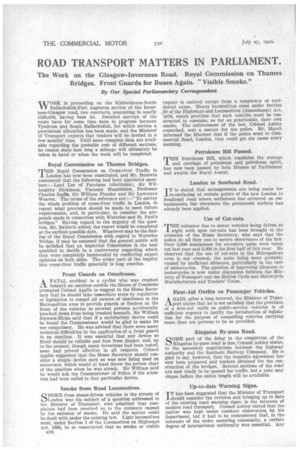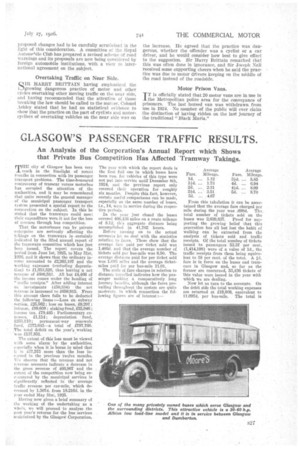ROAD TRANSPORT MATTERS IN PARLIAMENT.
Page 10

Page 11

If you've noticed an error in this article please click here to report it so we can fix it.
The Work on the Glasgow-Inverness Road. Royal Commission on Thames Bridges. Front Guards for Buses Again. "Visible Smoke."
By Our Special Parliamentary Correspondent.
WORK is proceeding on the Kinlochleven-North Ballachulish-Fort Augustus section of the Inverness-Glasgow road, two contracts, amounting to nearly £130,000, having been let. Detailed surveys of the route have for some time been in progress between Tyndrum and South Ballachnlish, for which section a provisional allocation has been made, and the Minister of Transport expects that tenders will be invited in a few months' time. Until more complete data are available regarding the probable cost of different sections, he cannot state how long a mileage will ultimately be taken in hand or when the work will be completed.
Royal Commission on Thames Bridges.
TITE Royal Commission on Cross-river Traffic in London has now been constituted, and Mr. Baldwin announced that the following had been appointed members :—Lord Lee of Fareham (chairman), Sir Willoughby Dickinson, Viscount Hambleden, Professor Charles Inglis, Sir William Plender and Sir Lawrence Weaver. The terms of the reference are :—" To survey the whole problem of cross-river traffic in rondon, to report what provision should be made to meet future requirements, and, in particular, to consider the proposals made in connection with Waterloo and St. Paul's bridges." Having regard to the urgency of the question, Mr. Baldwin added, the report would be completed at the earliest possible date. Whatever may be the finding of the Royal Commission with regard to Waterloo Bridge, it may be assumed that the general public will be satisfied that an impartial Commission is the best qualified to decide in a controversy regarding which they were completely bamboozled by conflicting expert opinions on both sides. The wider part of the inquiry into cross-river traffic generally is long overdue.
Front Guards on Omnibuses.
FATAL accident to a cyclist who was crushed 11. beneath an omnibus outside the House of Commons prompted Colonel Applin to suggest to the Home Secretary that he should take immediate steps by regulation or legislation to compel all owners of omnibuses in the Metropolitan area to provide guards or fenders on the front of the vehicles to prevent persons accidentally knocked down from being crushed beneath. Sir William Joynson-Hicks said that if a satisfactory device could be found the Commissioner would be glad to make its use compulsory. He was advised that there were many technical difficulties in the application of a front guard to an omnibus. It was essential that any device so fitted should be reliable and free from danger, and, up to the present, though many inventions had been tested, none had proved effective in all respects. Colonel Applin suggested that the Home Secretary should consider a simple device such as was now being used on motorcars, which would at least throw the person clear of the omnibus when he was struck. Sir William said he would ask the Commissioner of Police if his attention had been called to that particular device.
Smoke from Road Locomotives.
SMOKE from steam-driven vehicles in the streets of London was the subject of a question addressed to the Minister of Transport, who admitted that complaints had been received as to the nuisance caused by the emission of smoke. He said the matter could be dealt with under the existing law. Light locomotives must, under Section 1 of the Locomotives on Highways Act, 1896, be so constructed that no smoke or visible
n96
vapour is emitted except from a temporary or accidental cause. Heavy locomotives come under Section .30 of the Highways and Locomotives (Amendment) Act. 1878, which provides that such vehicles must be constructed to consume, as far as practicable, their own smoke. The enforcement of the law, Colonel Ashley remarked, wa's a matter for the police. Mr. March informed the Minister that if the police went to Commercial Road, London, they could get six cases every morning.
Petroleum Bill Passed.
MHE Petroleum Bill, which regulates the storage and carriage of petroleum and petroleum spirit, has now been passed by both Houses of Parliament and awaits the Royal Assent.
London to Southend Road.
IT is stated that arrangements are being made for re-surfacing at certain points of the new London to Southend road where settlement has occurred on embankments, but elsewhere the permanent surface has already been applied.
Use of Cut-outs. THE nuisance due to motor vehicles being driven at night with open cut-outs has been brought to the attention of the Home Secretary, who says that the police do all they can to secure observance of the law. Over 5,000 summonses for excessive noise were taken out last year and 3,000 in the first half of this year. He observes that the use of cut-outs in the Metropolitan area is not common, the noise being more probably caused by inefficient silencers, particularly in the case of motorcycles. The question of improving silencers in motorcycles is now under discussion between the Ministry of Transport and the British Cycle and Motorcycle Manufacturers and Traders' Union.
First-Aid Outfits on Passenger Vehicles. AGAIN, after a long interval, the Minister of Transport states that he is not satisfied that the provision of a first-aid outfit on public-service vehicles is of sufficient urgency to justify the introduction of legislation for the purpose of compelling vehicles carrying more than ten persons to be so provided.
Kingston By-pass Road.
SOME part of the delay in the completion of the Kingston by-pass road is due, Colonel Ashley states, to the necessary negotiations between the highway authority and the Southern Railway Company. He is glad to say, however, that the requisite agreement has now been prepared and tenders obtained for the construction of the bridges. Several sections of the road are now ready to be opened for traffic, but a year may elapse before the entire length will be available.
Up-to-date Warning Signs.
IT has been suggested that the Minister of Transport should consider the revision and bringing up to date of the existing road warning signs, in the interests of modern road transport. Colonel Ashley stated that the matter was kept under constant observation by his department, but it had to be remembered that, in the interests of the wider motoring community, a certain degree of international uniformity was essential, Any
proposed changes had to be carefully scrutinized in the light of this consideration. A committee of the Royal Automohile Club has prepared a revised scheme of road warnings and its proposals are now being considered by foreign automobile institutions, With a view to international agreement on the subject.
Overtaking Traffic on Near Side.
Sin HARRY BRITTAIN having emphasized the growing dangerous practice of motor and other cycles overtaking other moving traffic on the near side, and having recommended that the attention of those breaking the law should be called to the matter, Colonel Ashley stated that he had no statistical evidence to show that the practice on the part of cyclists and motorcyclists of overtaking vehicles on the near side was on
the increase. He agreed that the practice was dangerous, whether the offender was a cyclist or a car driver, and he would consider how best to give effect to the suggestion. Sir Harry Brittain remarked that this was often done in ignorance, and Sir Joseph Nall received some supporting cheers when he said the practice was due to motor drivers keeping on the middle of the road instead of the roadside.
Motor Prison Vans.
pis officially stated that 20 motor vans are in use in he Metropolitan police area for the conveyance of prisoners. The last horsed van was withdrawn from use in 1924. No member of the public will ever claim the distinction of having ridden on the last journey of the traditional "Black Maria."






























